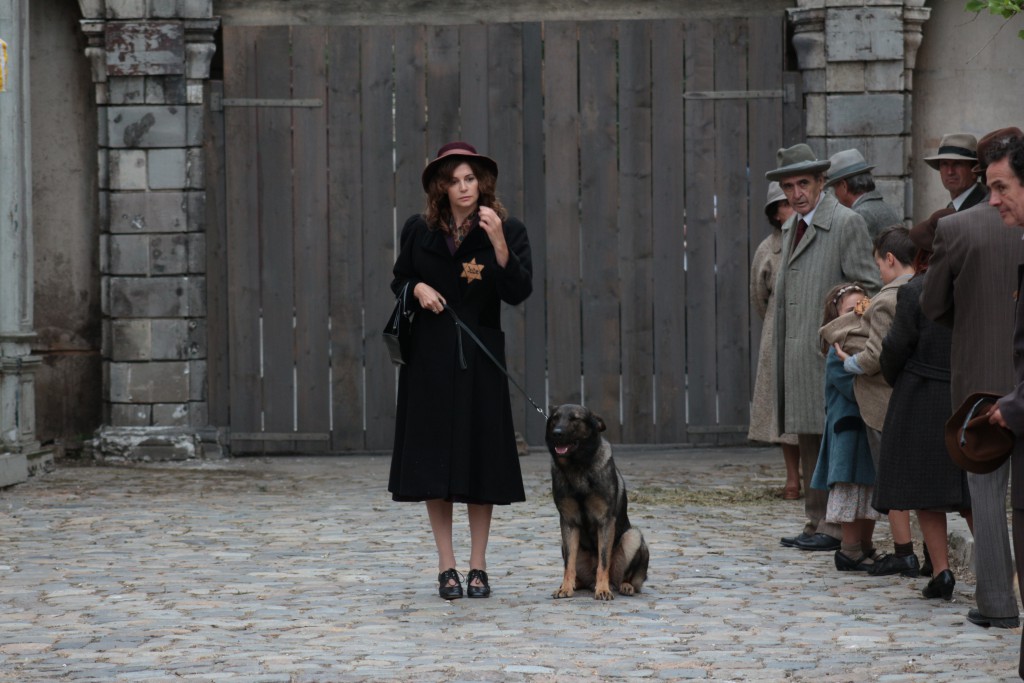
Dir.: Konstantin Fam; Cast: Oksana Fandera, Filipp Yankousky, Mariya King, Lenn Kudrjawski, Uliana Elina, Vyacheslav Chepurchenko; Russia/Belarus/Czech Republic/France/Poland/Israel 2017, 100 min.
Konstantin Fam’s drama debut is a trilogy of short films, shot between 2012 and 2017, its intertwined structure featuring human protagonists and mute witnesses of the Holocaust. This is probably the first major Russian feature concerning itself with Russian Jewish victims of the Shoah, since the topic was one of the taboos during Stalinism. Impassioned and powerful, it manages to avoid dramatics, concentrating on the details of the tragic events.
Shoes (Tufelki) is set in a small Russian town, featuring its characters from the knees downwards. The titular female shoes, optimistically coloured red, belong to a woman who will end up in the gas chambers of Auschwitz. Her shoes are now in the Museum of the former Camp, picked from a mountain of abandoned footwear. The camera traces her life through the other shoes she encounters: the happy shop owner who gives her the shoes for free; the little shoes of her daughter; and then the military boots of the German invaders, forcing her into an overloaded cattle truck. And then the military shoes of the German guard, who, we are left to surmise, closes the gas chamber hermetically. Devoid of dialogue, just background noise, and symphonic music, creating an eerie ballet.
Brut (Brutus) features the young shop owner of the first episode, Rozanna (Fandera), who is given a German Shepherd dog by her husband. The cute puppy develops into a loveable pet, but after the German army arrives, Jews are not allowed to have pets any more. Horst (Yankousky) an outwardly harmless looking SS man, with a model family, takes Brutus away, and Rozanna is forced to surrender “her only friend”. Horst trains the friendly Brutus to be a ‘killer dog’, but when the soldier is transferred to a Concentration Camp, he meets Rozanna, again but strangely fails to recognise her. In a bid to escape, Rozanna is then shot by Horst, but Brutus recognises Rozanna. This is in many ways the most cruel of the episodes, because Horst tries to transfer his murderous instincts to a defenceless animal, whose true nature survives, in spite of everything.
Violin (Skrypka) chronicles the instrument’s history. First given to a Jewish boy by his father in early 1930s Nuremberg, the violin ends up in contemporary New York. We discover why a Swastika is stamped inside the instrument, in a concentration camp where an officer is asked by his superior “to gather the best musicians for the Camp Orchestra”. Finally through a bizarre series of events, the violin is played at the Wailing Wall in Jerusalem, perhaps a rather conciliatory ending, but an inventive Holocaust story that plays a thoughtful and plangent tune.
Kam’s (unplanned) structure works very well throughout, showing the various ways in which silent witnesses can bring a message from the past for all of us. Fam avoids any didactic lectures, and concentrates on the small details, which can make such a difference. The DoPs (too many to name), create a convincing atmosphere; Shoes in particular is highly innovative and hauntingly captures our imagination. Witnesses never tries to be sentimental – but makes an extraordinary emotional impact: demonstrating the wilful distraction of the world of ordinary people.
SCREENING DURING RUSSIAN FILM WEEK | UNTIL 2 DECEMBER 2018